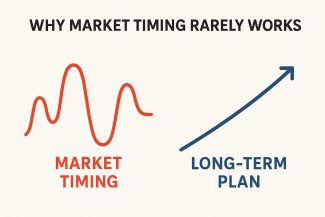
Why Market Timing Seldom Works and What You Should be Doing
Timing the Market may sound like a savvy investment strategy. You know, sell just before the next big decline to protect your unrealized gains and avoid losses, then jump back in just when the Market hits the bottom so you can ride the gravy train back up. That strategy seldom works for several reasons, such as:
🔮 As Clint Eastwood famously said in his first Dirty Harry movie, “Do you feel lucky, …?” It’s almost impossible to predict what the Market will do on a day-to-day basis. Most would say the results of tomorrow’s or any day’s close are random. So, the way I look at it is you have about a 50/50 chance of getting the sell decision timed correctly and about the same odds of predicting the Market Bottom buy decision. To be successful in a Market Timing maneuver, you need to guess both times correctly. Your probability of getting both right is about 25%. Again, are you feeling lucky?
🏛️ The sell side of your strategy is a taxable event. An investor may have good funding, portfolio or tax-strategy reasons to sell investments and realize gains, but Market Timing is not one of them.
🏊♀️ Ready to dive back in? Or not? Or maybe? Studies have shown that missing a small number of the Market’s up days severely hurt your long-term performance. For a real time example, we can look at the Market gyrations since April 2025. Even if you had successfully predicted the steep 11% decline in the S&P 500 between April 2nd and April 8th and unloaded your stocks, do you think you would have also predicted the almost equal one day jump on April 9? Let’s presume you missed buying back at the opening on April 9, when would you have re-entered the Market, which closed 27% higher on July 31 from the April 8th low?
Sound portfolio management is less about trying to predict or react to headlines of the day and more about staying the course with a plan that is designed to achieve your individual goals over a usually longer period referred to as your “investment horizon” (e.g. house purchase, college tuition, retirement).
